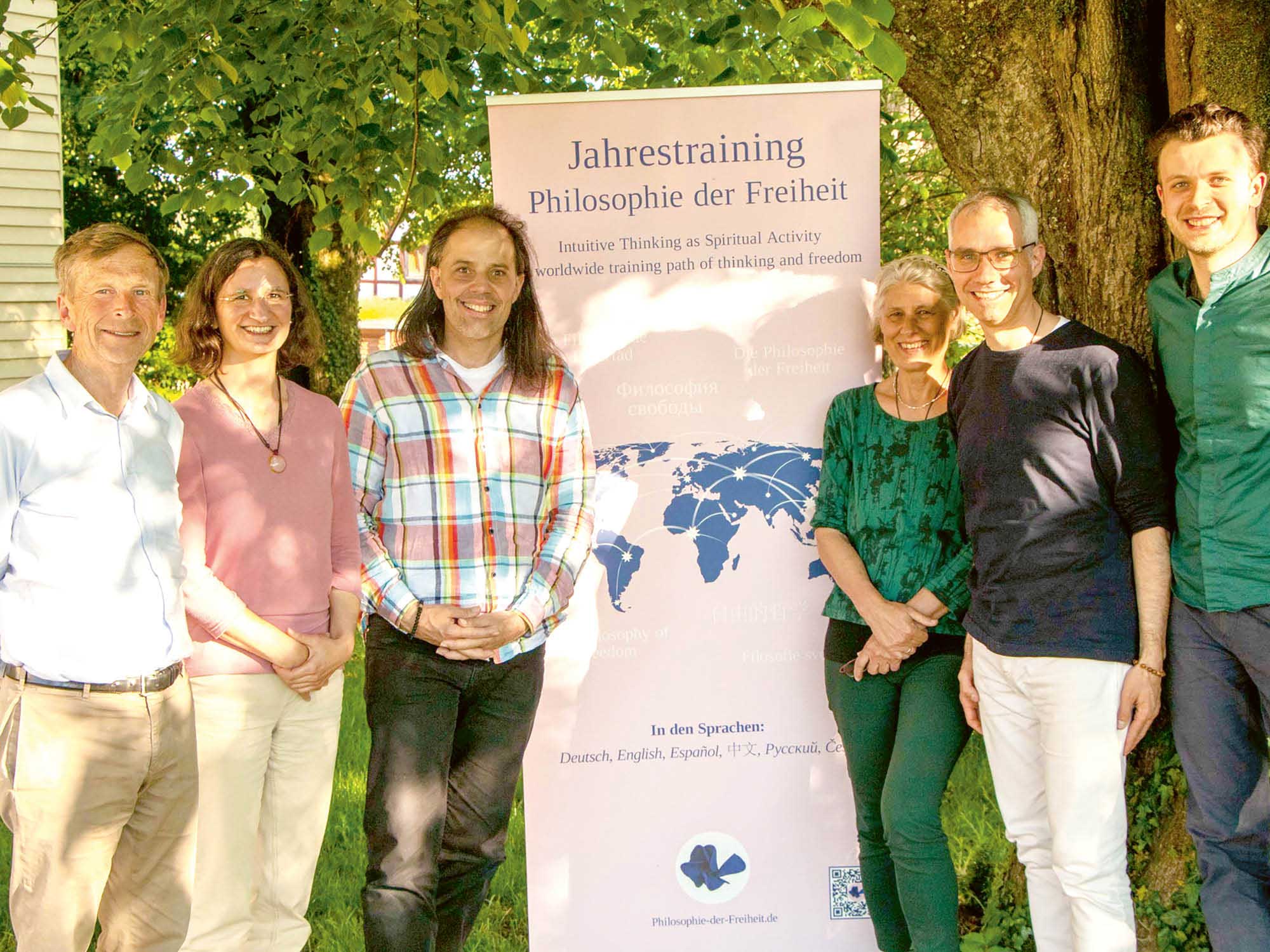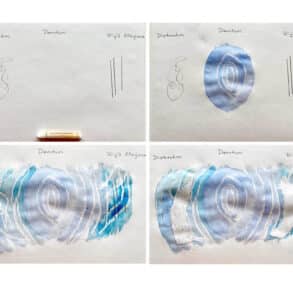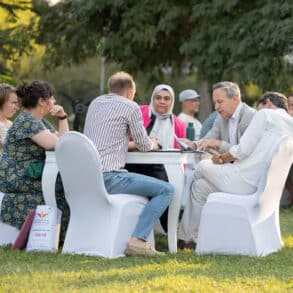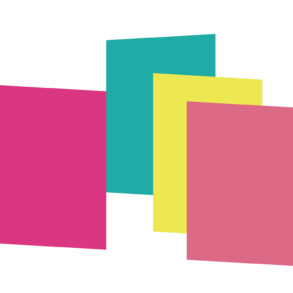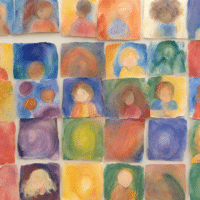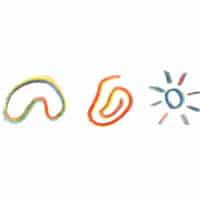Gaining an understanding of the spiritual—and living from it—is the longing and goal of anthroposophy. The Annual Training: Philosophy of Freedom starts a new cycle on September 29. People from all over the world will take part in this training course together.
Looking back on the Christmas Conference and the laying of the foundation stone in 1923, Rudolf Steiner wrote the following lines to the members of the General Anthroposophic Society on January 13th, 1924: “This could only be a laying of the foundation stone in terms of the ideal-spiritual. The soil in which the foundation stone was laid could only be the hearts and souls of the personalities united in the Society; and the foundation stone itself must be the view springing from the anthroposophic organisation of life. This view, as demanded by the signs of the present time, is the will to find the way to the contemplation of the spirit and to life from the spirit through the deepening of the human soul.”1
The core of anthroposophy, the essence of the foundation stone in the souls of human beings, could hardly be expressed more simply, freely and beautifully—as if this said everything essential. This sentence reveals a duality, a dual nature of human development. The path to the contemplation of the spirit would remain incomplete if it were not accompanied by the will to live from the spirit. The meditative redemption from the challenges and confusions of life finds its fulfilment in the renewed turning to life and in its conscious shaping out of spiritual sources.
Rudolf Steiner thus completes a major biographical arc. For the “dual nature”2 of human development is the central theme of his early work, The Philosophy of Freedom. The first part, The Science of Freedom, is a schooling path to the contemplation of the spirit. The second part, The Reality of Freedom, is a path to action, i.e. to living from the spirit. Beholding the spirit is science, for, in it, an essence is revealed. Acting from the spirit is freedom, because in it we realise the impulses of our own spiritual being.
Challenges
For many people, The Philosophy of Freedom is a challenge for various reasons. One is that it is primarily a path for schooling thinking, i.e. the spiritual activity that underlies our thinking. Another challenge lies in the temporal context in which Rudolf Steiner travelled his own “personal” path to freedom.3 A path that aims to lead to the contemplation of the spirit and to life from the spirit must be a challenge because the goal is a high one.


Impressions from the annual training. Courtesy photo
The Origin of Thinking
Thinking in our time often shows itself in an abstract, calculating, analytical, cold or even cruel light. We use it to build nuclear bombs and war drones, to create factory farming and inhumane working conditions, to exploit the earth’s resources even more completely and to establish insidious financial systems that reinforce injustices. “Only the educated people destroy the world”, the Indian mystic Sadhguru once said. In other words, only the people whose thinking was developed in our education systems are destroying the world. Amorality seems to be inherent in the thinking of our time. As if we had lost the soul, the essence of the world in it.
And yet thinking is the light that makes us aware of the connections in the world, that enables us to act clearly, creatively and constructively in the sense of the whole. It is as if thinking is a neutral force that illuminates things but does not judge them. It leaves us free to decide how we use it.4 This freedom of thinking is one of the reasons for human freedom in general. We are less free in our feelings and volitional impulses because we are less able to see through them. Why do I have certain impulses while my friend has completely different ones? Why do I react to a specific situation with certain feelings, while another person reacts completely differently? It’s not for nothing that advertising and the media appeal so much to our feelings and volitional impulses and so little to our differentiated, alert thinking. If we want information about them, we have to question them with our thinking. The freedom of thinking thus reveals a profound spiritual fact that also has a decisive significance for our actions.
In the first part of The Philosophy of Freedom, The Science of Freedom, the question of the “origin and meaning of thinking” is therefore at the beginning of the discussion.5 Step by step, we are led to a vivid inner experience of thinking as our very own spiritual activity. This becomes the starting point for the contemplation of the spirit.6 The key to dealing with The Philosophy of Freedom in this sense is not to study it abstractly, but to involve oneself step by step in the process of cognition.7 It thus becomes a spiritual adventure8 that leads us step by step to the experience of an essence, first in ourselves, then in the world.9
The special thing is that all these steps are not accompanied by great enlightenments, but by an intimate tenderness and a quiet feeling of bliss when a spiritual experience arises in individual moments. This feeling of bliss has to do with inner moments of freedom when we touch our own being, which is free from attachment to the world and “beyond subject and object.”10
The Reality of Freedom
If the contemplation of the spirit could be illuminated in individual moments, we come to The Reality of Freedom in the second part. This is intrinsically connected with acting from one’s own spiritual being. In this sense, “what is called the good […] is not what man ought to do, but what he wills when he brings his full true human nature to fruition.”11 Life from the spirit in the sense of The Philosophy of Freedom can be characterised by various qualities: It is an expression of our individual being,12 productive,13 and creative.14 We ourselves give it the goal of its destiny.15 It is free from the conditions of the past16 and makes the future effective.17 It is socially compatible,18 it is based entirely on love19 and places itself in an intuitive connection with the world.20
Anthroposophically speaking, there is a Michaelic aspect to its way of looking at the spirit.21 We are free in our thinking—it is up to us how we bring it to bear: cold and abstract or warm, constructive and full of love. We carry within us the possibility of achieving an initial essential realisation of ourselves by increasing our thinking activity and simply changing the direction of our gaze. This in turn connects us with the essence of the world. It is a way of redeeming thinking from its abstract activity to an essential—spiritual—experience.
The path to life from the spirit reveals an original Christian aspect22 if we associate this term with love of the world and not with a particular faith. Intuitive insight into the connection between our own spiritual being and the realities of the world gives rise to individual impulses. These are fuelled by “love for the object”23 to which they are directed. Love becomes the central motive for free action.24


Impressions from the annual training. Courtesy photo
Annual Training
The key to The Philosophy of Freedom lies in “experienced thinking contemplation.”25 This means that we are called upon to liberate thinking from its mere representationalism and bring it to “experience” within us. The annual Philosophy of Freedom training programme has adopted this approach. It is a schooling programme based on working through the individual sentences of The Philosophy of Freedom in a thoughtful and meditative way within oneself. This is done with the help of 600 thought cards in an individual way, while we are collectively connected with people from all over the world.
This path is accompanied and supported in many ways through weekly letters, tandem partners, regional groups, video conferences, exercises, an app, a login area and extra meetings for young people. In the last course, we accompanied 600 participants in 6 languages and 34 countries. It is very touching to see how we can meet in this way on such central topics as thinking, consciousness, intuition, individual impulses, love for action, freedom, humanity and much more across the boundaries of cultures, nationalities, religions and age on a deep level of harmony. We experience an important impulse of peace and understanding in this work.
New course September 29th, 2024 to April 13th, 2025.
Languages German, English, Spanish, Russian, Chinese, Japanese, Czech and Korean.
More Annual Training: Philosophy of Freedom
Translation Jeff Martin
Title image Team of the annual training. Courtesy photo
Footnotes
- Rudolf Steiner, The Laying of the Foundation Stone of the General Anthroposophical Society, p. 9, Rudolf Steiner Nachlassverwaltung, 6th edition, 2003.
- “The intellectual life overcomes the dual nature through knowledge, the moral life through the actual realisation of the free spirit.” Rudolf Steiner, The Philosophy of Freedom, GA4. Basic features of a modern world view. Results of spiritual observation according to the scientific method 1894. p. 121. Rudolf Steiner online archive, 4th edition, 2010.
- “I have gone my (way) as best I could; afterwards, I have described this way. How others should go, I could perhaps find a hundred ways afterwards. At first, I didn’t want to put any of them down on paper. Arbitrarily, quite individually, I have jumped over many a cliff; I have worked my way through thickets in my own way.” Rudolf Steiner, letter to Rosa Mayreder, 4 November 1894, in GA 39, Letters, p. 232.
- “For it is precisely in this way that one realises that reality cannot actually do anything to one in relation to the processing of concepts, that one can work and educate oneself in the freest possible way within the concepts and ideas.” Rudolf Steiner, The World of the Senses and the World of the Spirit, GA 134, p 23. Rudolf Steiner online archive, 4th edition, 2010.
- “It must become ever clearer that the question of the nature of human action presupposes the other question of the origin of thinking.” Rudolf Steiner, The Philosophy of Freedom, GA 4, p. 9.
- “This connection in the innermost experience of thinking within the mysteries of the world is the basic nerve of The Philosophy of Freedom. And that is why this philosophy of freedom contains the sentence: In thinking one grasps the mystery of the world at one point. (…) For if one really grasps (this point), if one has made an effort to have the thinking experience, then one no longer stands inside the world in which one previously stood inside, but one stands inside the etheric world.” Rudolf Steiner, Mystery Formations, GA 232, p. 4; Rudolf Steiner online archive, 4th edition 2010.
- In The Neverending Story by Michael Ende, this is expressed in a wonderful fairytale-like way in the transition from the first to the second part, when Bastian is faced with the decision of involving himself in the story and thus helping it to continue – to its infinity – or to freeze in the perpetual “return of the same.”
- See note 3.
- “In thinking we have given the element that unites our particular individuality with the cosmos into a whole. By feeling and sensing (also perceiving), we are individuals; by thinking, we are the all-one being that permeates everything.” Rudolf Steiner, The Philosophy of Freedom, GA 4, p. 61.
- “Thinking is beyond subject and object. It forms these two concepts as well as all others.” Rudolf Steiner, The Philosophy of Freedom, GA 4, p. 36.
- Rudolf Steiner, The Philosophy of Freedom, GA 4, p. 171.
- “It is not how all men would act that can be decisive for me, but what is to be done by me in the individual case.” Rudolf Steiner, The Philosophy of Freedom, GA 4, p. 113.
- “Nature makes of man merely a natural being; society makes of him a being that acts according to law; he can only make a free being of himself.” Rudolf Steiner, The Philosophy of Freedom, GA 4, p. 121f.
- “What the free spirit needs in order to realise its ideas, in order to assert itself, is therefore moral imagination.” Rudolf Steiner, The Philosophy of Freedom, GA 4, p. 139.
- “Therefore, human life has only the purpose and destiny that man gives it. (…) My mission in the world is not a predetermined one, but it is the one I choose for myself.” Rudolf Steiner, The Philosophy of Freedom, GA 4, p. 134f.
- “The action is not a standardised one that is carried out according to any rules, nor is it one that man carries out automatically in response to an external impulse, but one that is absolutely determined by its ideal content.” Rudolf Steiner, The Philosophy of Freedom, GA 4, p.112.
- “It (the free spirit) makes an absolutely first decision. It cares just as little what others have done in this case, nor what they have dictated.” Rudolf Steiner, The Philosophy of Freedom, GA 4, p. 138.
- “The free man lives in the confidence that the other free man belongs with him to a spiritual world and will meet him in his intentions.” Rudolf Steiner, The Philosophy of Freedom, GA 4, p. 119.
- “I recognise no external principle of my action, because I have found in myself the reason for action, the love of action.” Rudolf Steiner, The Philosophy of Freedom, GA 4, p. 115.
- “I do not examine intellectually whether my action is good or evil. I carry it out because I love it. It becomes ‘good’ when my intuition, immersed in love, is in the right place in the intuitively experienced world context; evil when this is not the case.” Rudolf Steiner, The Philosophy of Freedom, GA 4, p. 115.
- “One can […] say that The Philosophy of Freedom prepares us to recognise through freedom what can then be experienced in spiritual union with Michael.” Rudolf Steiner, Anthroposophical Guiding Principles, GA 26, p. 94. Rudolf Steiner online archive, 4th edition, 2010.
- “And what emerges is what is presented in the second part of my Philosophy of Freedom, ethical individualism, which now actually builds, even if this is […] not expressed, on the Christ impulse in man. It builds on that which man attains as freedom by transforming ordinary thinking into that which in my Philosophy of Freedom is called pure thinking, which rises into the spiritual world and brings forth from the spiritual world the impulses for moral actions, brings them forth by spiritualising something that is otherwise bound to the human body, the impulse of love. And by borrowing the moral ideals from the spiritual world through the moral imagination, they express themselves in their power, become the power of spiritual love.” Rudolf Steiner, The Philosophy of Thomas Aquinas, GA 74, p. 99. 4th edition Rudolf Steiner Verlag Dornach, Switzerland.
- “Only when I follow my love for the object, then it is I myself who act.” Rudolf Steiner, The Philosophy of Freedom, GA 4, p.115.
- Sergei Prokofieff has elaborated this dual aspect of the Michaelic and Christian in the schooling path of The Philosophy of Freedom in great detail in his book The Philosophy of Freedom and the Guardian of the Threshold, Verlag am Goetheanum; 2nd edition, 2015.
- “One must realise that every perceptual image receives its form from the organisation of the perceiving being, but that the perceptual image permeated by experienced, thinking contemplation leads the human being into reality.” Rudolf Steiner, The Philosophy of Freedom, GA 4, p. 91.

